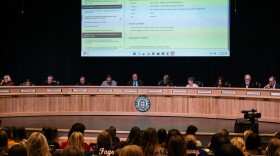LIANE HANSEN, host:
If Bush administration officials used unofficial e-mail accounts to avoid scrutiny over the firing of eight U.S. attorneys, they have surely been disappointed. The truth is, when it comes to e-mail, there are very few places to hide. So NPR's Laura Sydell examines why people continue to use e-mail for confidential communication.
LAURA SYDELL: By now, most people know it: if they put it in an e-mail at work, the law says, the boss owns it. Lewis Maltby is the president of the National Workrights Institute.
Mr. LEWIS MALTBY (President, National Workrights Institute): Not only can your boss read that e-mail; they probably are reading your e-mail.
SYDELL: A government employee doesn't get much more protection, says David Vladeck, a professor of law at Georgetown University. Despite some exemptions for government workers, the Bush administration doesn't really have much choice when it comes to turning over the e-mails.
Professor DAVID VLADECK (Law, Georgetown University): It is treated as any other record, a paper record that might be generated by agencies' officials in the course of their carrying out their professional duties.
SYDELL: So how is it that everyone knows e-mails are like a public shout-out, yet they still use them for private conversations?
(Soundbite of "Nights in White Satin")
Mr. JUSTIN HAYWARD (Lead Vocalist, The Moody Blues): (Singing) Letters I've written never meaning to send.
SYDELL: Remember those sappy late-night letters written to a crush or a lost lover? In the light of morning, they rarely looked as poetic or thoughtful as they did at midnight. Fortunately, to send them, the writer would have to walk to the nearest mailbox, giving them a little time to reflect. That's part of the problem with e-mails, says Maltby: it's more like a conversation.
Mr. MALTBY: People use it as if they were speaking, equally as informally. And you don't think that carefully about what you say, you just talk.
SYDELL: And Maltby says a lot of people think their employers don't monitor everything.
Mr. MALTBY: People, without realizing it, assume that the company isn't reading things without a good reason, and that's the assumption that's dead wrong.
SYDELL: Think about the number of people who've gotten in trouble because of what they put in an e-mail. Oliver North tried to erase his, but without success. The anti-trust case against Microsoft wasn't helped when a Bill Gates e-mail surfaced in which he expressed the desire to wipe out the competition. Think of Mark Foley, who got caught making inappropriate remarks to congressional pages.
Danah Boyd, a Ph.D. candidate in information sciences at University of California-Berkeley, has been researching this. She says the problem is that most of us can't comprehend the idea that in an e-mail, we may be speaking to an infinite number of people.
Ms. DANAH BOYD (Ph.D. Candidate, University of California-Berkeley): We would be incapable of speaking. And so what ends up happening is that we, in our heads, have an idea of who that audience is that we're speaking to. And we speak to them, and, you know, we hope for the best.
SYDELL: For many lawyers, e-mails have been a nightmare, says law professor Vladeck.
Prof. VLADECK: Plaintiff lawyers call e-mail evidence mail, because people usually use e-mails for making unguarded communications that they don't really reflect over.
SYDELL: Yet Vladeck is not optimistic that people are going to catch on. E-mail is just too seductive, too easy. Danah Boyd thinks we are going through a major transformation about what it means to be private and what it means to be public.
Ms. BOYD: When I look at this, I think that we are going to spend many years confused, and I think there's going to be many more cases of just, oh my gosh, can you believe they wrote this down? - before we ever come up with a solution for us, personally, of how to live this way.
SYDELL: Boyd thinks that the average person may start to understand celebrities a little better when they complain that they can't say anything without being scrutinized. Laura Sydell, NPR News.
(Soundbite of music)
HANSEN: You're listening to NPR News. Transcript provided by NPR, Copyright NPR.






